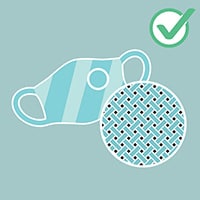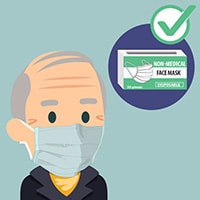"Summary of Recent Changes, Updates as of September 23, 2021
This page describes different types of masks and respirators you can use to protect yourself and others from getting and spreading COVID-19.
Masks are designed to contain your respiratory droplets and particles. They also provide you some protection from particles expelled by others.
Respirators are designed to protect you from particles, including the virus that causes COVID-19, and in doing so they also contain your respiratory droplets and particles so you do not expose others.
CDC continues to learn more about the effectiveness of different types of masks and respirators for preventing COVID-19.
Masks
Cloth Masks can be made from a variety of fabrics and many types of cloth masks are available.
Wear cloth masks with
- A proper fit over your nose and mouth to prevent leaks
- Multiple layers of tightly woven, breathable fabric
- Nose wire
- Fabric that blocks light when held up to bright light source

Do NOT wear cloth masks with
- Gaps around the sides of the face or nose
- Exhalation valves, vents, or other openings (see example)
- Single-layer fabric or those made of thin fabric that don’t block light
Disposable Masks
Disposable face masks are widely available. They are sometimes referred to as surgical masks or medical procedure masks.
Wear disposable masks with
- A proper fit over your nose and mouth to prevent leaks
- Multiple layers of non-woven material
- Nose wire

Do NOT wear disposable masks with
- Gaps around the sides of the face or nose (see example)
- Wet or dirty material.."
Face mask and Respirators
No comments:
Post a Comment